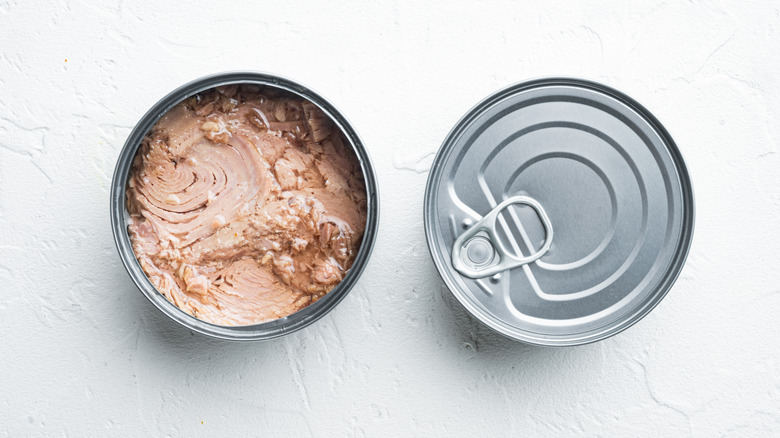New Study Finds Mercury Levels In Canned Tuna Are Unpredictable
Tuna is an acquired taste, but one that is widely enjoyed around the globe. People love to put tuna in sandwich melts, make it into salads, wrap it in lettuce, or sometimes simply eat it out of a bowl with some mayo and seasoning. According to "American Tuna" by Andrew F. Smith, tuna was first canned in Southern California by Albert P. Halfhill and his co-owners of the California Fish Company in 1903. Their product wasn't an instant hit but the fledgling company eventually found success, and Halfhill became known as a pioneer in the tuna packing industry, according to "The Origins of California's High-Seas Tuna Fleet" by August Felando and Harold Medina. The popularity of canned tuna waxed and waned over the years, but today it is a pantry staple in many homes.
We now know a little more about tuna than we did back then, but unfortunately, we learned that tuna contains traces of mercury. The U.S. Food and Drug Administration (FDA) explains that mercury is a toxin noted for its neurological effects. Long-term exposure for adults can cause symptoms like depression, memory loss, numbness, or issues with speaking, listening, and sight, and worse. Children and babies are particularly vulnerable. According to Healthline, high levels of mercury consumed during pregnancy can cause growth and cognitive development issues in the fetus.
Taking this into consideration, a new study has discovered that individual cans of tuna sometimes contain significantly higher amounts of mercury than average, and consistently eating them may have serious effects.
Unpredictable levels of mercury mean pregnant people might want to avoid tuna all together
Consumer Reports recently conducted its own research on canned tuna brands Bumble Bee, Chicken of the Sea, StarKist, Safe Catch, and Wild Planet. You possibly have one, or a few of these in the pantry at this moment, but you might want to be cautious before eating them (and pregnant women might want to abstain entirely).
The research by Consumer Reports found that the levels of mercury in canned tuna aren't consistent even within the same brand. On average, canned tuna (especially light varieties) has low levels of mercury, but in individual cans, mercury levels sometimes spiked to much higher levels. One in five cans contained enough mercury to reduce the FDA's recommendation about how often a person should consume that particular tuna. CBS News says that due to this unpredictability, you may be ingesting more mercury than initially believed, so pregnant people are better off avoiding eating tuna in general rather than risk complications.
Deep sea fish such as swordfish and tuna tend to have higher levels of mercury than other fish like salmon and smaller surface water fish. Unfortunately, even cooked tuna is not any safer than raw or canned. The problem that this new report points out is that the mercury in each can of tuna is widely variable, meaning that one can of tuna low in mercury could be sitting right next to a can containing much higher levels of the toxin. It certainly makes the tuna aisle a minefield, and for pregnant people, it's safer to avoid the food altogether.

